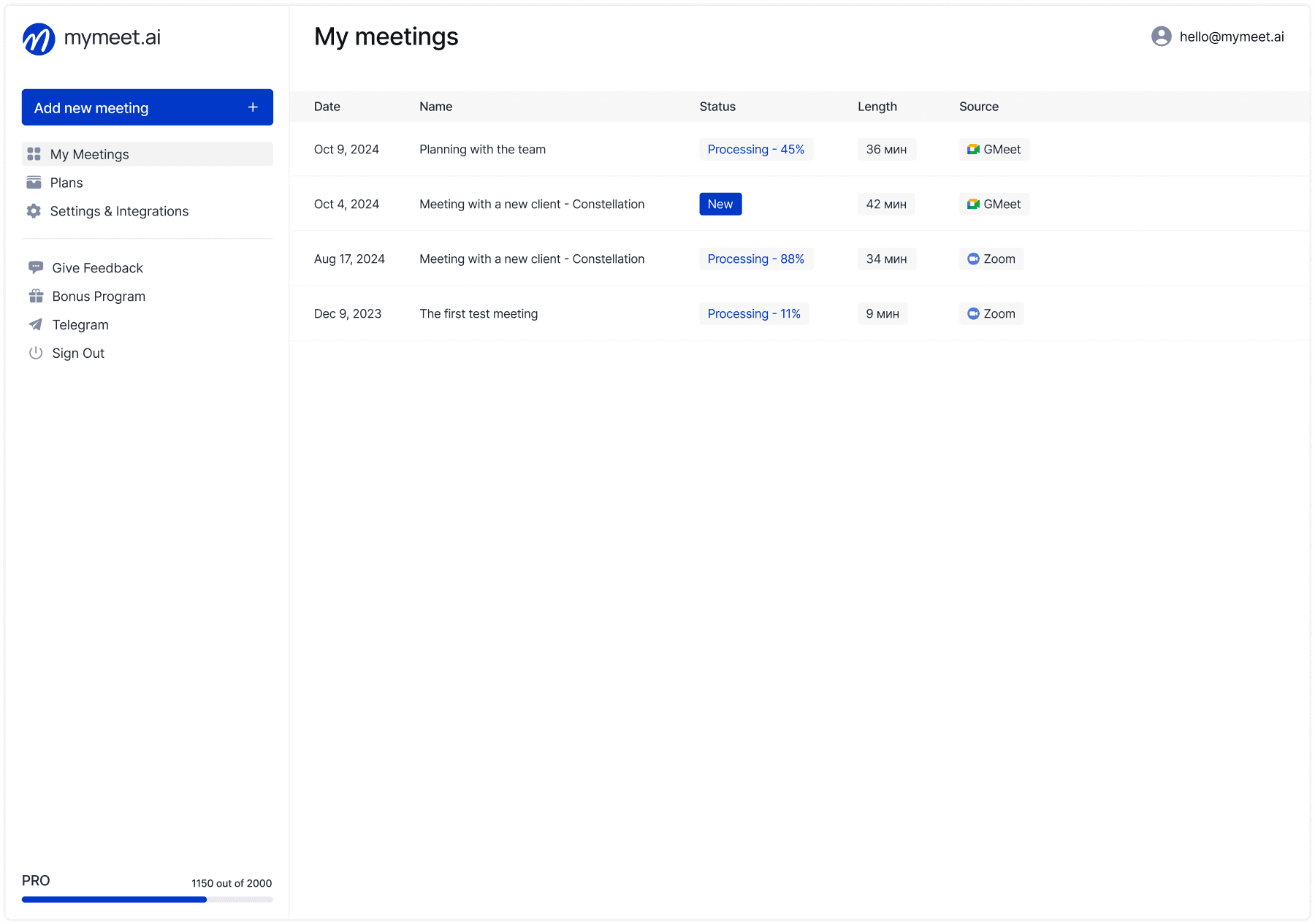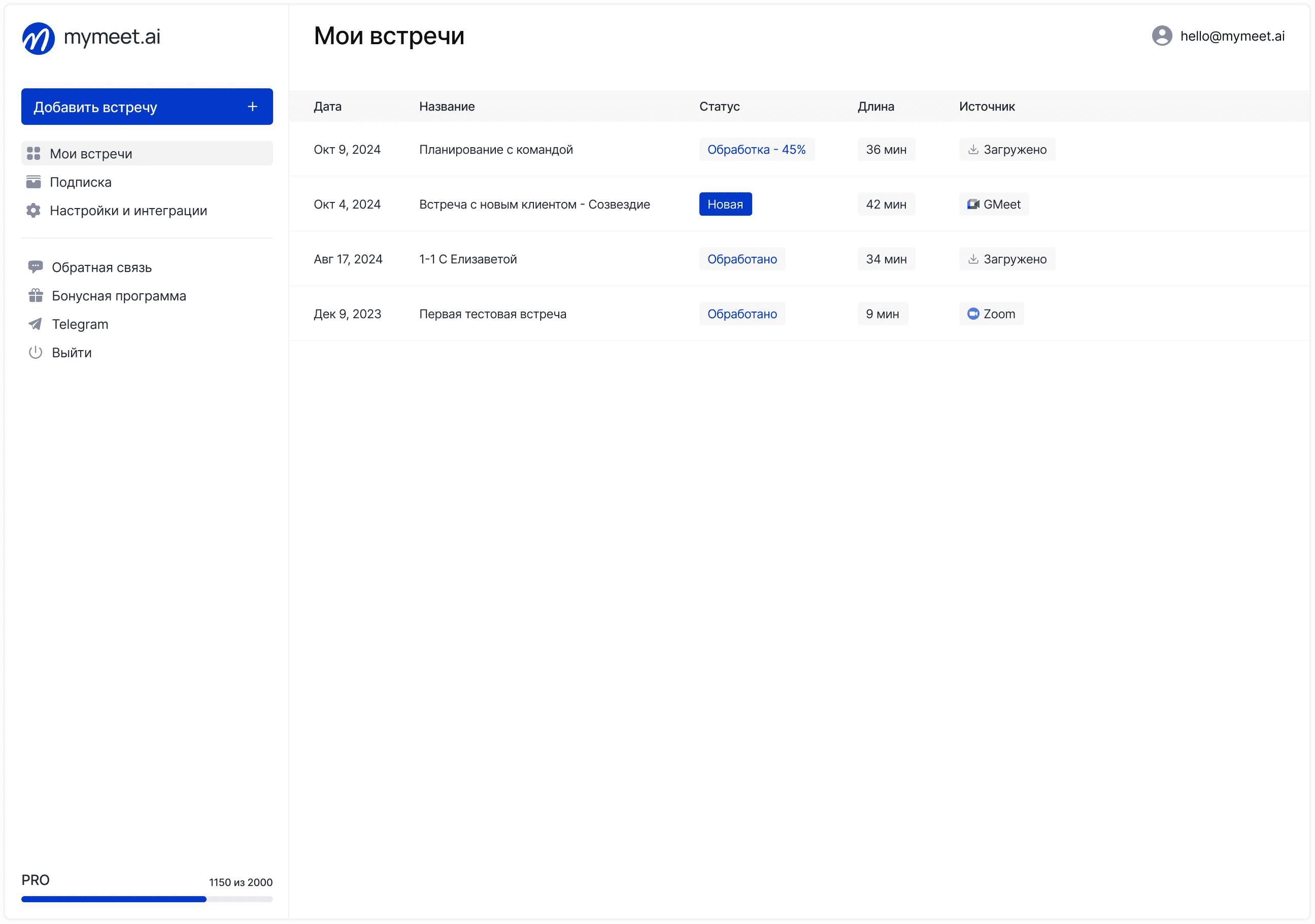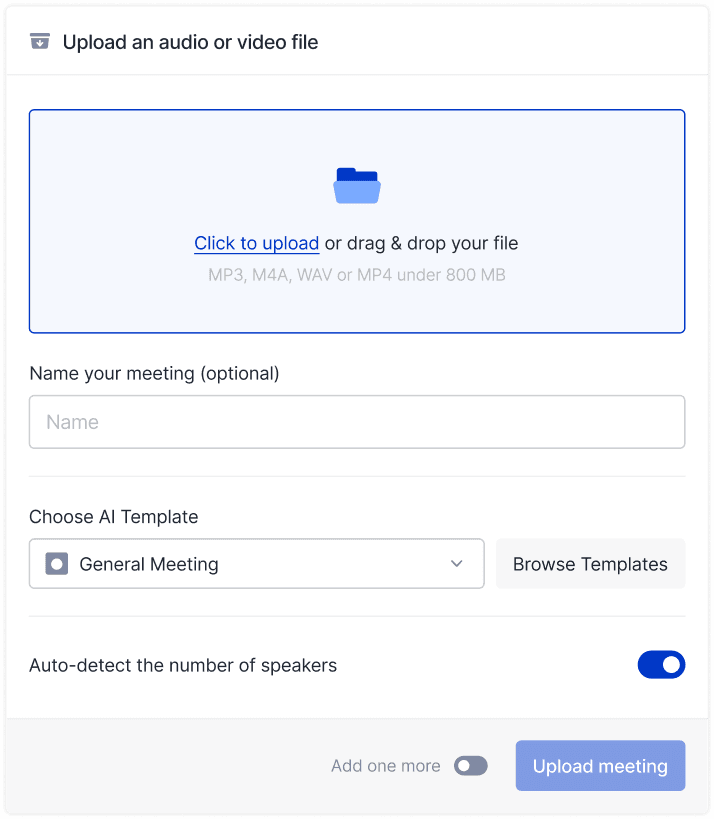Meeting Tips

Andrey Shcherbina
Nov 15, 2025
You scheduled a meeting with a client for Tuesday at 3:00 PM. Monday evening you realize you can't attend—urgent work situation arose, you got sick, force majeure happened. Need to cancel the meeting, but how to do it properly without damaging relationships and looking unprofessional? Abrupt cancellation without explanation can destroy months of building business contacts.
Hi there! The mymeet.ai team works with thousands of professionals and knows that proper meeting cancellation is as important a skill as conducting them. Sometimes cancellation is inevitable, but it must be done correctly while preserving reputation and professional relationships. We'll cover technical cancellation methods in different systems, business etiquette rules, and ready templates for different situations.
When You Need to Cancel a Meeting
Not every situation justifies canceling a scheduled meeting. Let's examine when cancellation is justified and when it's better to find a way to hold the meeting as planned.
Valid Cancellation Reasons
Illness or indisposition—you feel unwell, got sick, have high temperature. Meeting in this state will be unproductive, plus risk of infecting other participants.
Family or personal emergency—serious family problem, urgent situation requiring immediate attention. This is force majeure that everyone understands.
Critical schedule conflict—management scheduled important meeting at same time, key client urgently requires meeting, situation occurred that's more important than current meeting.
Technical problems—equipment necessary for meeting broke, no access to critical materials without which discussion is meaningless, video connection not working for online meeting.
Changed circumstances—issue you planned to discuss resolved another way, project canceled, meeting need disappeared.
Force majeure—natural disasters, transportation or infrastructure accidents, other unforeseen circumstances beyond your control.
When Cancellation Is Unjustified
"More important things came up"—this devalues the other person and shows their time isn't important.
Poorly planned schedule—forgot you have another meeting, didn't account for travel time, overestimated your capabilities. This is your planning error.
Didn't manage to prepare—meeting requires preparation but you didn't do it on time. This is unprofessionalism, don't shift consequences onto others.
"Don't feel like it" or "changed my mind"—frivolous attitude toward commitments destroys business reputation.
Inconvenient time that you yourself proposed. Should have thought about this during coordination.
Alternatives to Cancellation
Before complete cancellation consider other options:
Time shift—maybe the other person can meet several hours later or earlier same day. This is better than complete cancellation.
Meeting reduction—instead of an hour, conduct 30 minutes to discuss only critical questions. Better short meeting than none.
Format change—instead of in-person meeting, hold video call; instead of video—audio call; instead of synchronous meeting—email exchange.
Delegation—send competent colleague instead of yourself. Coordinate with other person in advance.
How to Cancel a Meeting: Step-by-Step Instructions
Proper cancellation follows clear sequence that minimizes negativity for relationships.
Step 1: Make Decision as Early as Possible
The earlier you realize you can't attend—the better. Don't postpone cancellation message hoping situation will resolve.
As soon as it becomes clear meeting won't happen—start cancellation process immediately. Every hour of delay reduces time the other person has to adjust plans.
Step 2: Warn as Far in Advance as Possible
Optimal warning timeframes:
48+ hours ahead—ideal option for any meetings. Other person manages to replan day, schedule other meetings, use time productively.
24 hours ahead—acceptable for most business meetings. Minimum standard of professional cancellation.
3-4 hours ahead—acceptable only for force majeure. Apologize especially sincerely.
Less than 2 hours ahead—extremely bad. Use only for emergency circumstances. Person may already be en route.
Late arrival without warning—worst option. Complete disrespect for other person.
Step 3: Choose Right Communication Method
Communication method for cancellation depends on meeting importance and time until it.
Personal call—use for:
Important clients and partners
Meetings with management
Cancellation less than 4 hours ahead
Situations requiring detailed explanation
Email—suitable for:
Regular business meetings
When there's time (more than day)
Official cancellation recording
Situations requiring documentary confirmation
Messenger message—acceptable for:
Informal meetings with colleagues
If this is how team communicates
Don't use for external clients
Calendar cancellation—technical method:
Google Calendar, Outlook, other systems
Must supplement with personal message
Insufficient alone for important meetings
Combined approach—best option: Call for important meetings + send email for recording + cancel technically in calendar.
Step 4: Properly Formulate Message
Proper cancellation message structure:
1. Apology—start with sincere expression of regret "I apologize for the inconvenience caused..." "Unfortunately, I must cancel..."
2. Reason explanation—briefly explain why canceling "An urgent work situation arose..." "Unfortunately, I got sick and doctor recommends..." "Unforeseen circumstances occurred..."
3. Alternative proposal—immediately propose new time "I can propose meeting [date 1] at [time] or [date 2] at [time]" "Would it be convenient to reschedule to [specific options]?"
4. Meeting importance confirmation—show it remains priority "Discussing [topic] remains important priority for me" "I look forward to discussing [topic]"
5. Feedback request—give other person voice "Please let me know which option suits you" "Or suggest convenient time for you"
6. Gratitude—end politely "Thank you for understanding!" "Thanks for flexibility!"
Step 5: Technically Cancel Meeting
After coordination with other person, cancel meeting in all systems.
In Google Calendar:
Open meeting event
Click "Delete" or "Cancel"
Select "Send notification" to participants
Add comment with brief explanation
In Outlook:
Open meeting in calendar
Click "Cancel Meeting"
Add message for participants
Send cancellation notification
In other calendar systems:
Find event cancellation function
Must send notification to participants
Add comment with explanation
Important: Technical calendar cancellation doesn't replace personal message for important meetings!
Ready Templates for Meeting Cancellation
Use these templates adapting to specific situation.
Template 1: Client Meeting Cancellation
Subject: Rescheduling meeting [date]
Dear [Name],
I apologize, but I must reschedule our meeting scheduled for [date] at [time]. [Brief reason: urgent work situation arose / got sick / unforeseen circumstances occurred].
I propose following alternative options:
[Date 1], [day of week], [time]
[Date 2], [day of week], [time]
[Date 3], [day of week], [time]
Discussing [meeting topic] remains important priority for me. Please let me know which time suits you, or propose your option.
Thank you for understanding!
Best regards, [Name] [Position] [Contact]
Template 2: Cancellation Due to Illness
Subject: Meeting cancellation [date]—force majeure
Hello, [Name]!
Unfortunately, I must cancel our meeting scheduled for [date] at [time]. I got sick and doctor recommends staying home.
I can propose two options:
Hold meeting online at same time if this format suits you
Reschedule to next week: [date 1] or [date 2]
Please let me know what's more convenient for you.
Once again, I apologize for inconvenience and thank you for understanding!
Best regards, [Name]
Template 3: Internal Meeting Cancellation
Subject: Team meeting cancellation [date]
Hi, team!
Canceling meeting scheduled for [date] at [time]. [Reason: most of team at another meeting / question resolved / circumstances changed].
Rescheduling to [new date] at [time]. Updated calendar event.
If anyone has urgent questions—write in chat or call directly.
Thanks! [Name]
Template 4: Interview Cancellation
Subject: Rescheduling interview for [position name]
Good day, [Name]!
Unfortunately, I must reschedule our interview scheduled for [date] at [time]. [Reason: technical problems arose in office / interviewer availability changed / force majeure].
We're very interested in talking with you. I propose following alternative options:
[Date 1], [time]
[Date 2], [time]
[Date 3], [time]
If these options don't suit, please propose convenient time for you.
I apologize for plan changes!
Best regards, [Name] [Position] [Company]
Template 5: Brief Cancellation for Colleague
Subject: Rescheduling meeting
Hi, [Name]!
Sorry, can't meet today at [time]—urgent project situation.
Can you do tomorrow at same time? Or suggest when convenient.
Thanks for understanding! [Name]
Business Etiquette Rules for Cancellation
Following etiquette preserves professional relationships even with forced cancellation.
Be Honest but Concise
Explain cancellation reason truthfully but without excessive details.
Good formulations: "Urgent work situation arose" "Unfortunately, got sick" "Unforeseen family circumstances occurred" "Project circumstances changed"
Bad formulations: "More important things came up"—devalues other person "Just changed my mind"—shows frivolity "Forgot I have another meeting"—unprofessionalism
Don't lie about illness if healthy—lie can be revealed and destroy trust completely.
Apologize Sincerely
Apology should sound sincere, not formal.
Sincere apologies: "I sincerely apologize for inconvenience caused" "Unfortunately, I must cancel" "Very sorry this happened"
Formal apologies: "Sorry" (too dry) "I beg your pardon" (official)
Show you understand the inconvenience you're creating for other person.
Always Propose Alternative
Don't just cancel—immediately propose new time options.
Correct: "I can propose Thursday 3:00 PM or Friday 11:00 AM. What's more convenient for you?"
Incorrect: "Can't meet. Let's do it sometime later"
Proposing specific dates shows your interest in meeting. Give 2-3 options to choose from.
Confirm Meeting Importance
Show that meeting remains priority despite cancellation.
"Discussing [topic] is very important to me" "I look forward to discussing [question]" "I remain interested in our cooperation"
This reassures other person that cancellation is forced and temporary.
Thank for Understanding
End with polite gratitude.
"Thank you for understanding!" "Thanks for flexibility!" "I appreciate your patience!"
Even if person is internally dissatisfied, gratitude softens situation.
Cancellation Specifics in Different Situations
Meeting context affects how to properly cancel.
With Potential Client
Potential client hasn't decided to work with you yet. Improper cancellation can close deal opportunity.
Specifics:
Warn minimum 48 hours ahead
Call personally in addition to letter
Explain reason more detailed than usual
Propose 3-4 options including weekends
Emphasize interest in cooperation
Consider delegating to colleague
With Current Client
Regular client has work history with you and knows your style.
Recommendations:
Call personally for important clients
Explain situation honestly
Propose compensation (free additional consultation)
Don't make cancellation regular practice
Use accumulated trust credit
With Management
Manager allocated time for meeting with you from packed schedule.
Rules:
Cancel only for serious reasons
Warn as far ahead as possible
Explain in detail why you can't
Ask when convenient for manager
Be ready that may insist on meeting
Propose online format as alternative
Interview with Candidate
Candidate prepared, possibly declined other interviews, specially freed time.
How to cancel:
Warn minimum 2-3 days ahead
Explain reason (technical problems, force majeure)
Propose several alternatives
Confirm interest in candidate
If position closed—report honestly
Group Meeting
Many participants harder to reschedule—need to find everyone's time.
Specifics:
Warn everyone simultaneously
Explain reason briefly
Use poll to choose new time
Consider delegating leader
Check if can be held without you
Typical Mistakes When Canceling Meetings
Avoid these mistakes to preserve reputation.
Last-Minute Cancellation
Notify an hour before meeting without force majeure—sign of unprofessionalism.
Other person already prepared, possibly en route, declined other matters. Plan time realistically and warn in advance.
No Apology
"Meeting is canceled" without apology sounds rude and tactless.
Always start with expression of regret even if reason is objective.
Vague Alternatives
"Let's do it sometime later" doesn't allow planning.
Propose specific dates and times. Vagueness creates impression of lack of interest.
False Reasons
Lie about illness easily revealed through social media.
Be honest. Lie destroys trust completely when revealed.
Silent No-Show
Not show up without warning—worst option.
This is complete disrespect. Always warn even if very late.
How to Minimize Cancellation Need
Best cancellation—one you didn't have to make.
Plan Time Realistically
Don't plan tightly—leave buffers between meetings.
Account for travel time, preparation, unforeseen delays. Don't take meeting if understand time insufficient.
Confirm in Advance
Day before meeting send reminder.
"Reminding we meet tomorrow at 3:00 PM. Looking forward!"
This gives opportunity for both sides to reschedule if problems arose.
Use Calendar Correctly
Block time for important tasks like meetings.
Synchronize personal and work calendars. Check before confirming new time.
Delegate When Possible
Send colleague instead of complete cancellation if meeting important.
Coordinate replacement with other person in advance.
Automating Meeting Management with Mymeet.ai
Proper management of meetings reduces cancellation need.
Mymeet.ai helps organize meeting work:
✅ Automatic reminders day before meeting through calendar integration
✅ Meeting recording that took place with complete agreement capture
✅ Transcription and reports—nothing lost from discussions
✅ Knowledge base—quick search of past agreements
✅ Task extraction—AI finds all agreements automatically
When there's complete clarity about past meetings and agreements, less need to convene new ones or reschedule existing ones.
Conclusion
Meeting cancellation is inevitable in business life, but must be done professionally. Warn as far ahead as possible, apologize sincerely, explain reason briefly, propose specific alternatives, thank for understanding.
Use right communication channel—call for important meetings, write letters for recording, cancel technically in calendar. Follow ready templates adapting to situation.
Minimize cancellation need through realistic planning, confirming meetings in advance, proper calendar use.
Try mymeet.ai for free—180 minutes of automatic meeting recording and documentation without card attachment.
Frequently Asked Questions About Meeting Cancellation
How far in advance should you warn about cancellation?
Minimum 24 hours ahead for business meetings, 48 hours ahead for meetings with clients and partners. This gives time to adjust plans. Less than 3 hours ahead—only for force majeure with special apologies.
Do you need to explain cancellation reason?
Yes, brief explanation mandatory to show cancellation is forced. General context without details sufficient—"urgent situation," "got sick," "circumstances changed." Don't need personal life details.
How to cancel if just changed mind?
Be honest but tactful. Don't say "changed mind" directly. Use "priorities changed" or "meeting lost relevance." Propose alternative or explain why meeting no longer needed.
Can you cancel via messenger?
Depends on formality. For colleagues in informal setting—yes. For clients, partners, management—better email or call. Messenger acceptable if this is how you communicate.
What to do if other person doesn't respond to new time proposal?
Remind in 1-2 days politely. "Hello! Didn't receive response about meeting reschedule. Which option convenient?" If silence after second reminder—try another communication channel.
How often can you cancel meetings with one person?
One cancellation—normal. Two in a row—raise questions. Three cancellations—destroy trust. Don't make cancellation regular practice. Plan realistically.
Do you need to call if canceling by email?
For important clients and urgent cancellations—yes. Call shows respect. For regular meetings with sufficient time, email sufficient.
How to cancel recurring meeting?
Cancel through calendar selecting "this and all following events." Supplement with letter explaining why series no longer needed and what alternative if meetings still relevant.
What to do if already running late?
Call immediately and report delay with approximate arrival time. Apologize. Propose rescheduling if delay more than 30 minutes. Don't disappear silently.
How to automate meeting reminders?
Use mymeet.ai with calendar integration—automatic reminders to participants day before meeting. Reduces number of forgotten meetings and urgent cancellations. Plus automatic recording of held meetings with complete documentation.
Andrey Shcherbina
Nov 15, 2025








